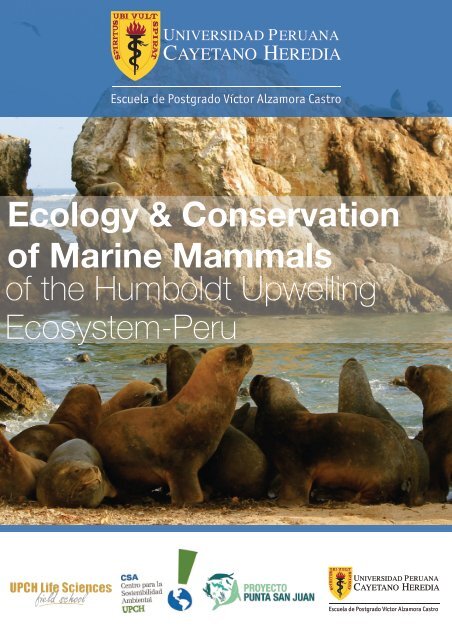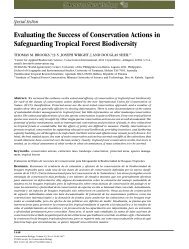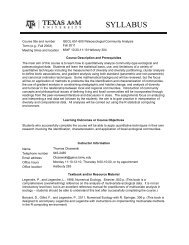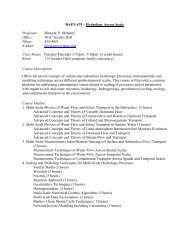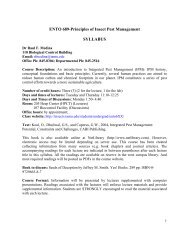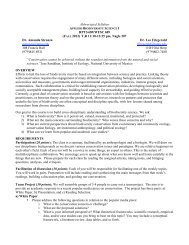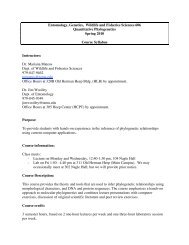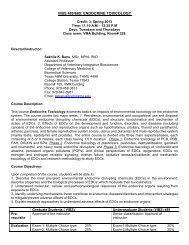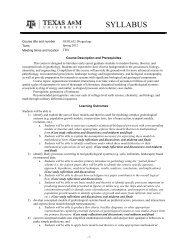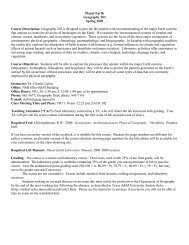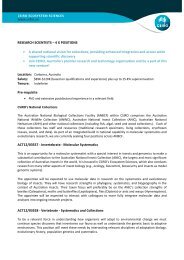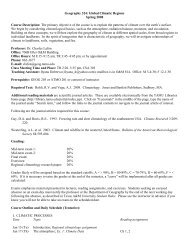Marine mammals field course in Peru - Ecology and Evolutionary ...
Marine mammals field course in Peru - Ecology and Evolutionary ...
Marine mammals field course in Peru - Ecology and Evolutionary ...
Create successful ePaper yourself
Turn your PDF publications into a flip-book with our unique Google optimized e-Paper software.
Escuela de Postgrado Víctor Alzamora Castro<br />
<strong>Ecology</strong> & Conservation<br />
of <strong>Mar<strong>in</strong>e</strong> Mammals<br />
of the Humboldt Upwell<strong>in</strong>g<br />
Ecosystem-<strong>Peru</strong><br />
Escuela de Postgrado Víctor Alzamora Castro
Presentation :<br />
This is a residential <strong>field</strong>-based <strong>course</strong> <strong>in</strong> <strong>Peru</strong> on the biology, anatomy, physiology,<br />
ecology, evolution, behavior, population biology, management <strong>and</strong> conservation of<br />
mar<strong>in</strong>e <strong>mammals</strong>, expla<strong>in</strong><strong>in</strong>g why this group is so important, controversial <strong>and</strong><br />
<strong>in</strong>terest<strong>in</strong>g.<br />
Students will be provided with a comprehensive knowledge on mar<strong>in</strong>e mammal<br />
ecology with special enphasis on species <strong>in</strong>habit<strong>in</strong>g the Humboldt Current Upwell<strong>in</strong>g<br />
Ecosystem off the coast of <strong>Peru</strong> -a develop<strong>in</strong>g country <strong>in</strong> with the largest s<strong>in</strong>gle species<br />
fishery <strong>in</strong> the world.<br />
This is a university-accredited <strong>course</strong> <strong>and</strong> is <strong>in</strong>tended for students <strong>in</strong> the summer<br />
vacation <strong>and</strong> for enthusiastic <strong>in</strong>dividuals with keen <strong>in</strong>terest <strong>in</strong> the mar<strong>in</strong>e environment.<br />
This <strong>course</strong> is suitable for MSc., undergraduate students <strong>in</strong> the last 3 years of study <strong>and</strong><br />
<strong>in</strong>dividuals who want to learn from experts about the ecology <strong>and</strong> conservation of sea<br />
lions, fur seals, dolph<strong>in</strong>s, whales, mar<strong>in</strong>e otters of the south Pacific Ocean.<br />
The <strong>course</strong> will take place <strong>in</strong> Lima <strong>and</strong> <strong>in</strong> Punta San Juan. Lima is the capital <strong>and</strong> largest<br />
city of <strong>Peru</strong>, one of the top mega diverse countries <strong>and</strong> home of the Cayetano Heredia<br />
University, the local host <strong>in</strong>stitution.<br />
Punta San Juan (15º22'S, 75º12'W) is a 54 hectare (133 acres) headl<strong>and</strong> located <strong>in</strong><br />
the town of Marcona 500 km south of Lima. Punta San Juan has been protected for<br />
more than 60 years by the <strong>Peru</strong>vian government for the exploitation of guano, a<br />
natural fertilizer made from seabird dropp<strong>in</strong>gs.<br />
Dur<strong>in</strong>g the 8 full days <strong>in</strong> the <strong>field</strong>, students will be exposed to lectures, <strong>field</strong>work, data<br />
collection <strong>and</strong> analysis on resident mar<strong>in</strong>e <strong>mammals</strong> while be<strong>in</strong>g lodged at the<br />
oceanfront <strong>field</strong> station.<br />
www.upch.edu.pe/epgvac/
<strong>Ecology</strong> & Conservation of <strong>Mar<strong>in</strong>e</strong> Mammals<br />
of the Humboldt Upwell<strong>in</strong>g Ecosystem-<strong>Peru</strong><br />
Objective :<br />
By the end of this <strong>course</strong>, students will be able to:<br />
Underst<strong>and</strong> concepts of mar<strong>in</strong>e mammal biology<br />
<strong>and</strong> ecology.<br />
Design <strong>and</strong> collect behavioral data on wild<br />
populations of mar<strong>in</strong>e <strong>mammals</strong>.<br />
Respond critically to mar<strong>in</strong>e conservation issues <strong>in</strong><br />
a develop<strong>in</strong>g country with the largest s<strong>in</strong>gle<br />
species fishery.<br />
Assessment :<br />
This <strong>course</strong> is open to students from different<br />
universities world wite. All students will be<br />
evaluated by <strong>course</strong> <strong>in</strong>structors accord<strong>in</strong>g to<br />
participation (25%), group discussions (25%),<br />
groups <strong>field</strong> project (30%) <strong>and</strong> project<br />
presentation (30%).<br />
Prerequisites :<br />
University level students should be at the last 3<br />
years of undergraduate studies. It is<br />
recommended an <strong>in</strong>troductory <strong>course</strong> <strong>in</strong><br />
vertebrate biology or mar<strong>in</strong>e biology. Students<br />
at other levels should have a general knowledge<br />
of mar<strong>in</strong>e life <strong>and</strong> experience <strong>in</strong> vertebrate<br />
biology is desirable.<br />
www.upch.edu.pe/epgvac/
<strong>Ecology</strong> & Conservation of <strong>Mar<strong>in</strong>e</strong> Mammals<br />
of the Humboldt Upwell<strong>in</strong>g Ecosystem-<strong>Peru</strong><br />
Study Plan :<br />
MODULE 1: Humboldt Current Ecosystem<br />
This module will cover topics <strong>in</strong> the abiotic about abiotic<br />
features of the Humboldt Current Ecosystem off <strong>Peru</strong><br />
<strong>and</strong> the major human activities tak<strong>in</strong>g place <strong>in</strong> this locality<br />
mar<strong>in</strong>e (i.e., anchoveta fishery, fish meal plants, etc.).<br />
MODULE 2: Topics <strong>in</strong> <strong>Mar<strong>in</strong>e</strong> Mammal Biology<br />
In this module cover topics on basic biology, ecology,<br />
anatomy, physiology, evolution, behaviour <strong>and</strong><br />
population biology of mar<strong>in</strong>e <strong>mammals</strong> with emphasis on<br />
the species liv<strong>in</strong>g on the coast off the Humboldt Current<br />
Upwell<strong>in</strong>g Ecosystem.<br />
MODULE 3: Field projects: design <strong>and</strong> data<br />
collection<br />
In this module will be presented several methods on how<br />
to design <strong>and</strong> collect data <strong>in</strong> the <strong>field</strong> on mar<strong>in</strong>e <strong>mammals</strong><br />
through observation <strong>and</strong> sample collection <strong>in</strong> situ.<br />
MODULE 4: Critical th<strong>in</strong>k<strong>in</strong>g: <strong>Mar<strong>in</strong>e</strong> conservation<br />
science <strong>and</strong> policy<br />
This module will cover current issues of mar<strong>in</strong>e<br />
conservation at a global <strong>and</strong> local scale (Humboldt<br />
Current Ecosystem) through presentation of case<br />
studies <strong>and</strong> group discussions. Students will th<strong>in</strong>k on<br />
how to apply a project <strong>in</strong> mar<strong>in</strong>e mammal conservation <strong>in</strong><br />
a country like <strong>Peru</strong>.<br />
www.upch.edu.pe/epgvac/
<strong>Ecology</strong> & Conservation of <strong>Mar<strong>in</strong>e</strong> Mammals<br />
of the Humboldt Upwell<strong>in</strong>g Ecosystem-<strong>Peru</strong><br />
Ma<strong>in</strong> teachers :<br />
Monica Muelbert, PhD.<br />
Dr. Muelbert was born <strong>in</strong> Brazil <strong>and</strong> then studied her PhD at Dalhousie University<br />
(Canada) on size at wean<strong>in</strong>g <strong>in</strong> harbor seals. She is currently professor <strong>and</strong><br />
supervisor at the Postgraduate Program <strong>in</strong> Biological Oceanography at the<br />
Federal University of Rio Gr<strong>and</strong>e, Brazil. Monica is found<strong>in</strong>g member of the Lat<strong>in</strong><br />
American Society of Specialists on Aquatic Mammals (SOLAMAC), Ad hoc<br />
consultant for Brazil National Scientific Council, member of the Expert Group on<br />
Birds <strong>and</strong> <strong>Mar<strong>in</strong>e</strong> Mammals for the Scientific Committee for Antarctic Research<br />
(SCAR-EGBMM), <strong>and</strong> others.<br />
Patricia Majluf, PhD.<br />
Dr. Majluf was born <strong>in</strong> <strong>Peru</strong> <strong>and</strong> then studied her PhD at University of Cambridge<br />
(UK) on reproductive ecology of South American fur seals. She is founder <strong>and</strong><br />
director of the Centre for Environmental Susta<strong>in</strong>ability at the Cayetano Heredia<br />
University (CSA-UPCH) <strong>in</strong> Lima, <strong>Peru</strong>. Patricia is found<strong>in</strong>g member of the<br />
SOLAMAC, associate research scientist for the Wildlife Conservation Society<br />
(20yrs). She has received various grants <strong>and</strong> awards for mar<strong>in</strong>e conservation <strong>in</strong><br />
<strong>Peru</strong> (Whitley Fund for Nature, BBVA <strong>and</strong> others) <strong>and</strong> has recently been <strong>in</strong>vited<br />
to act as PEW fellow.<br />
Bob Brownell, PhD.<br />
Dr. Brownell received his Ph.D. from the University of Tokyo (Japan) <strong>and</strong> has<br />
conducted research on the biology <strong>and</strong> conservation of whales, dolph<strong>in</strong>s <strong>and</strong><br />
porpoises throughout the world. Dr. Brownell is a Senior Scientist for International<br />
Protected Resources with NOAA Fisheries at the Southwest Fisheries Science<br />
Center <strong>in</strong> California, USA. Bob has been a member of the U.S. delegation to the<br />
International Whal<strong>in</strong>g Commission (IWC), President of the Society for <strong>Mar<strong>in</strong>e</strong><br />
Mammalogy, <strong>and</strong> has published close to 200 scientific papers, book chapters,<br />
<strong>and</strong> management documents on various aspects of whale, dolph<strong>in</strong>, <strong>and</strong> porpoise<br />
biology, conservation, <strong>and</strong> management.<br />
Susana Cárdenas-Alayza, MSc.<br />
Ms. Cárdenas-Alayza MSc. degree <strong>in</strong> Zoology from the University of British<br />
Columbia (Canada) with research on prey abundance <strong>and</strong> population dynamics<br />
of South American fur seals. Susana is currently director of the Punta San Juan<br />
Project, associate researcher of the CSA-UPCH <strong>and</strong> Coord<strong>in</strong>ator for Field<br />
Programs <strong>in</strong> <strong>Peru</strong> for the Chicago Zoological Society. Ms. Cárdenas-Alayza is a<br />
current member of the p<strong>in</strong>niped specialist group for IUCN, member of the<br />
Society for <strong>Mar<strong>in</strong>e</strong> Mammalogy, <strong>and</strong> others.
Cost :<br />
<strong>Ecology</strong> & Conservation of <strong>Mar<strong>in</strong>e</strong> Mammals<br />
of the Humboldt Upwell<strong>in</strong>g Ecosystem-<strong>Peru</strong><br />
$ 1,800 US dollars<br />
DOES INCLUDE<br />
Transport to <strong>and</strong> from the Lima airport<br />
Lodg<strong>in</strong>g <strong>in</strong> Lima dur<strong>in</strong>g the <strong>course</strong><br />
Round trip from Lima to the<br />
Punta San Juan <strong>field</strong> site<br />
Lodg<strong>in</strong>g, meals <strong>and</strong> transport<br />
at the <strong>field</strong> site<br />
Tuition<br />
Adm<strong>in</strong>istrative fees<br />
Course materials<br />
Course certificate<br />
Course Schedule :<br />
Day 1. Saturday, Aug 3rd<br />
DOES NOT INCLUDE<br />
Travel from home country to <strong>Peru</strong><br />
Visa costs<br />
M<strong>and</strong>atory <strong>in</strong>ternational<br />
accident <strong>and</strong> health <strong>in</strong>surance<br />
Personal expenses. It is suggested<br />
students br<strong>in</strong>g at least $300US<br />
for personal spend<strong>in</strong>g money<br />
Onl<strong>in</strong>e transaction fee or bank-tobank<br />
wire transfer fees (fees may<br />
vary accord<strong>in</strong>g to your bank)<br />
Course <strong>in</strong>troduction <strong>and</strong> oppen<strong>in</strong>g lectures at university campus<br />
(Miraflores) all morn<strong>in</strong>g. Lunch with students <strong>and</strong> teachers on campus.<br />
Students will be transported to bus term<strong>in</strong>al to go the <strong>field</strong> on Saturday<br />
night.<br />
Days 2-9. Sunday, Aug 4th - Sunday, Aug 11th<br />
Residential <strong>field</strong> <strong>course</strong> at the Punta San Juan guano reserve <strong>in</strong> Ica. All<br />
lodg<strong>in</strong>g, transport <strong>and</strong> meals will be provided. Transport to <strong>field</strong> site is<br />
overnight, departure at 9pm <strong>and</strong> 6am arrival. Students will travel <strong>in</strong><br />
country with teachers at all times.<br />
Day 10. Monday, Aug 12th<br />
Clos<strong>in</strong>g lectures at university campus (Miraflores) all morn<strong>in</strong>g. Lunch<br />
with students <strong>and</strong> teachers on campus.<br />
www.upch.edu.pe/epgvac/
Important Dates :<br />
Registration April 15th to June 30th, 2013<br />
Duration August 3rd to August 12th, 2013<br />
Payments:<br />
You can pay for this <strong>course</strong> at our onl<strong>in</strong>e store: http://store.upch.edu.pe<br />
*All students must pay <strong>course</strong> fee by June 30th 2013.<br />
Informations <strong>and</strong> Registration<br />
Escuela de Postgrado Víctor Alzamora Castro<br />
Phones: (51-1) 626 9401 anexo 1138<br />
Phones: (51-1) 619-7700 anexo 3435 - 3437<br />
E-mail: claudia.castillo.c@upch.pe<br />
scardenas@csa-upch.edu.pe<br />
admision.postgrado@ofic<strong>in</strong>as-upch.pe<br />
www.upch.edu.pe/epgvac/<br />
www.upch.edu.pe/epgvac/<br />
Escuela de Postgrado Víctor Alzamora Castro


